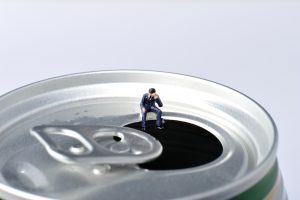“The virtuous soul that is alone is like a lone burning coal; it will grow colder rather than hotter”. —St. John of the Cross
We all know that technology is a double-edged sword. It creates wonderful opportunities to contact individuals around the world while adding a myriad of distractions that make that communication difficult. While sitting in a restaurant eating and talking with family, the golf team from the University of Illinois came in, sat down and ordered their dinner. While waiting for dinner, all twelve golfers silently were absorbed on their devices checking their social media or playing games. There was absolutely no conversation going on between them. Community requires connection. Undivided attention in conversation is rare these days for many of us.
People need connection. It doesn’t come without purposeful intervention during conversation. It allows us to find meaningfulness in the common places of daily living. Without it the likelihood of discovering our personal brilliance dims. The lack of connection creates suffering in the community as it becomes more cold and calculated.
In order for community to foster personal brilliance there must be curiosity which includes a desire to understand and learn about others’ thoughts, attitudes, and feelings in the context of relationship. Without it, we become like a pinball between bumpers, reacting to what is around us and missing the journey inward that leads to brilliance.
Several years ago, a woman lost a son in a single vehicle accident on his way to work. Her son had inspired many to live and dream big, face fears, and appreciate nature. He loved the outdoors and planned to one day live in his favorite state, Colorado, and become a teacher.
Some years after his death, the mom was visiting her oldest son who lived in Colorado Springs. She brought a picture of her deceased son with her on the trip. While there, she visited the Garden of the Gods with the beautiful towering sandstone formations. During her hike through the garden, she met a young man who was climbing, and she told him the story of her beloved deceased son. She asked if the climber would be willing to take her son’s picture and wedge it under the highest rock that he scaled.
The young man respectfully suggested he take the picture with him and snap a photo of her son with him and his friends as they scaled each peak in Colorado. Each time after taking a photo, they would send it to her. Humbled by the gesture, this mother instantly felt connected to this young man she just met. Moments earlier, he was an isolated stranger. Now he was someone who helped her deeply connect to her lost loved one.
In an ordinary moment of grief and through the brilliance of two strangers, a beautiful moment of healing was created. This is how it is with community. We discover and cultivate connection, which brings us deeper into our heart, where the brilliance of healing lies.
Connection helps us to understand the meaning of living. Mother Teresa once spoke “being unwanted, unloved, uncared for, forgotten by everybody is a much greater hunger, a much greater poverty than the person who has nothing to eat.” Feeling forgotten and invisible is devastating. When you drive to work, worship, or play, do you notice the street people in your community? Not knowing what to do with misfortune, many look away from the homeless, choosing to deal with discomfort by distancing themselves from it. What about the person at the grocery store who shuffles by with a blank stare on his face? Do you think of him as invisible?
Folks warehoused in nursing homes across our country feel disenfranchised and forgotten. At this level of living, it really doesn’t matter what possessions you once owned, who you have known, or really anything else. Being unloved, uncared for, and forgotten is the greatest poverty among the living. A fragmented, disenfranchised world distorts and undermines our potential for cultivating our brilliance in everyday places of living. Isolation deadens connection like a cell phone when it’s out of range. Community and commonality are important ingredients when fostering individual brilliance.
I have led approximately 300+ intense weekend workshops with men who are in recovery from sex addiction. Each session numbers about fifteen men who have seriously committed to stop acting out. Most have been successful in doing so. Still, these men seek to emotionally grow themselves so that they experience more than sobriety. Their hope is to repair broken relationships and cultivate healthy relational intimacy with themselves and their committed partner.
These weekends have become a cocoon, a safe space to expose ugly intent, immature response, and emotional adolescence. Providing a container to express overwhelming sadness (usually via anger) with total acceptance is usually transformative and life changing for these men. Creating a space for someone to be livid and angry at another person who is present in respectful ways has been immensely helpful, even when they wanted to physically fight each other.
During one workshop, one guy told a story about something that happened at work. Another guy accused him of not acting like a man. Both men stared and postured, suggesting they were ready to clobber each other. Once the machoism and bluster settled, each realized that they would likely need to leave if they came to blows. Or they could kiss and make up. Thank God they chose the latter. Before the weekend was over, both learned to accept each other’s differences, actually becoming closer because of the way they handled the altercation.
We create community to connect. It involves the courageous choice to be real and vulnerable. Within the context of groups, I have experienced men sharing their deepest pain with blood curdling cries of remorse, loss, and loneliness. Group therapy that becomes community is based on the mutuality of common shared brokenness. When people compete and compare themselves to others who have shared, the mutuality evaporates and group effectiveness no longer exists.
A safe and trusting community breeds safe emotional and physical touch. Here, vulnerability and trust is serendipitously expressed through our grief, joy, and challenge. When there is relational safety in community, anything and everything can be explored, sifted and sorted through. Pain becomes the fellowship’s touchstone and signpost indicating imbalance in life. Community provides a sound studio to listen to pain’s message. Common shared brokenness is its draw, not common likeness or interest. Becoming emotionally naked by sharing our deepest feelings and secrets is commonplace and expected. It’s a space where we can fit and be accepted as we are. It is a sanctuary where we learn how we can wear our own skin well. It’s a space to accept our own acceptance while staring at imperfection. It is a place to grow ourselves into adult maturity and discover inner brilliance.





